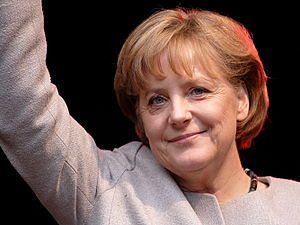Why Angela Merkel is in a Bind

Angela
Merkel's victory has surprised no one. Her re-election to a third term
as Chancellor was an easy ride and a personal triumph. Most Germans
viewed her as the Mutter who has preserved them from the recession that
has afflicted the rest of Europe.
But
now her real troubles begin. She has to form a coalition government but
everyone expects it will take her a lot of time, maybe two months.
The Italian press makes her problems a lot clearer than the New York Times and I thought I'd share with you what I found in La Stampa
of 23 September (articles of Francesca Sforza, Tonia
Mastrobuoninviata). If you don't speak Italian, here is the situation in
a nutshell.
Merkel
cannot govern alone. But prospective partners are leery. In the past
eight years, she has destroyed her junior partners who lost substantial
percentages of their voters. This happened, in her first term, to the
socialists and in her second term, to the Free Democrats who fell below
the minimum 5 percent threshold needed to enter Parliament.
Small wonder the socialists - the Social Democratic Party
- are cautious. They've asked her to wait until they have a meeting
this coming Friday to decide exactly what their position in any new
government would be and what they would ask her. Establishing a platform
first before entering into a partnership with Ms. Merkel is undoubtedly
a wise move (and one that has been hailed in the Italian press: this is
something Italian politicians never think of doing). It should protect
the party later from any defections.
Moreover, they need to digest their defeat which everyone assigns to Peer Steinbruck who was clearly a poor choice to run against Merkel. Not the first time a socialist party picks the wrong candidate! But moving away from Steinbruck may mean rejuvenating the party and making it more socially-conscious and less conservative and rightist.
Because
the Social Democrats in Germany, like socialists elsewhere in Europe
(it must be in their DNA!), have famously been torn by doubt and dissension,
notably when Oskar Lafontaine had a fight with Gerard Schroeder over his "Agenda 2010"
- the policy measures that relaunched Germany and pulled it out of its
status as "the sick man of Europe", as it was known in the early 2000s.
Oskar Lafontaine left the Social Democrats and went on to create Linke, a
radical party to the left.
But Angela Merkel is not without her own problems. If she has sailed to victory, it is largely thanks to the Christian Social Union
votes, the Bavarian "cousins", who took 50% of the votes in Bavaria.
The CSU also known as the party of the "Laptop and Lederhosen" (the
famous leather trousers) is of course traditionally allied to her
Christian Democrats. But the two don't see eye to eye on everything.
There are two points on which they disagree. For the CSU:
1.
any alliance with the Greens is out; the Greens many years ago (from
1980 to 1993) had included in their program the "liberalization of
sexual relations with children", a nice term for pedophilia!
2.
they won't enter any coalition government unless a measure to introduce
tolls on the major German highways is adopted, but with toll payments
only applicable to foreigners.
Now,
apart from the fact that such a measure is unpleasantly anti-European,
it is obviously very difficult to implement since there are no customs
offices on the borders (like in Switzerland, for example, where
foreigners entering with their cars do have to pay). It would be a lot
easier to make everyone pay, regardless of nationality. An additional
problem is that Merkel's party, the Christian Democrats, don't agree
with the idea.
For
the first time I feel almost sorry for Ms. Merkel. It won't be easy to
put all these people together, and dropping the socialists to work with
the Greens is pretty much unthinkable.
What is going to be the likely result of all this for Europe?
We
all know that so far Merkel has been tough on Europe, insisting on
austerity even though it is clear that this is not the solution. More
austerity leads to a deeper recession and more debt as I have often
blogged here. Fiscal policies, to work, must always be counter-cyclical.
The moment to reduce the debt is when an economy is booming, not when
it's in the doldrums. Will she continue to do so?
In her first public declaration after her victory, she insisted there would be no change for Europe.
But
my hopes are that there will be some changes. The
Free Democrats who were anti-Europe and pro-austerity are gone for
good. The socialists are likely to be a lot less pro-austerity as they
seek to implement their own social programs (pension reform, education,
stimulus to consumption etc) and they are also notoriously pro-Europe.
So
yes, I do believe something might change in favor of Europe. Angela
Merkel has always called for "more Europe" but never meant it. Now she
might have to turn to concrete measures rather than limit herself to
slogans...
What do you think?










Published on September 25, 2013 03:48
No comments have been added yet.



